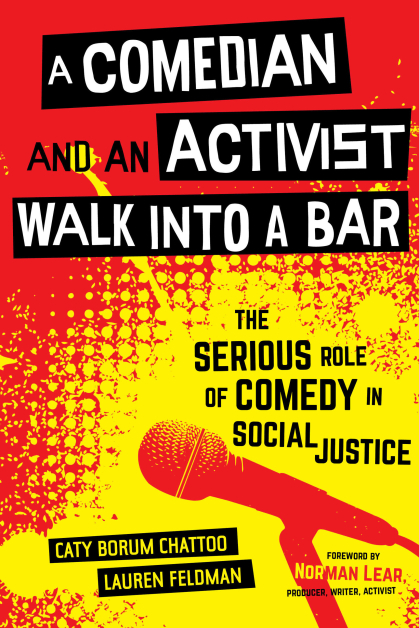Comedy Can Help Change the World, Rutgers Researcher Says
Comedy helps contribute to social change when done in the right way
Comedy can play an important role in challenging people to address critical social issues, says Lauren Feldman, associate professor at Rutgers’ School of Communication and Information.
The co-author of A Comedian and an Activist Walk into a Bar: The Serious Role of Comedy in Social Justice says media and technological disruption – combined with newly invigorated calls for justice – have created the ideal conditions for boundary-pushing, socially critical, comedy to not only thrive in the entertainment marketplace but also play a strategic role in efforts to call attention to global poverty, climate change, immigration, racial justice and sexual assault.
Feldman discusses how comedy and shows like Last Week Tonight with John Oliver and Black-ish can be used in serious advocacy work to confront injustice.
Why is comedy a misunderstood vehicle for serious public engagement?

People often incorrectly assume that comedy – because it is funny and entertaining – is inappropriate for communicating about serious issues, or that it can serve as a distraction from important problems. However, our research shows that it is precisely because comedy is funny and entertaining that it is capable of engaging and motivating people around challenging issues. Comedy pulls people in and creates a positive emotional connection, which can, in turn, inspire engagement and action. More recently, digital-era mediated comedy – including satirical news, sitcoms, sketch, stand-up, and funny documentaries – has served as a powerful influencer in contemporary social justice issues.
How can it help shape social justice movements?
Comedy can, through its effects on audiences, help contribute to social change by drawing attention, disarming audiences, lowering resistance to persuasion, breaking down social barriers and stimulating sharing and discussion. In addition to its effects on individuals, comedy also can have broader cultural effects, shaping news coverage and social media discourse, providing visibility to alternative ideas and marginalized groups, and serving as a resource for collective action. Given comedy’s potential for social influence, activists and advocacy organizations are increasingly using it in their strategic communication efforts.
Can you provide an example of how this can be done appropriately?
Rise is an organization that advocates for civil rights protections for sexual assault survivors. Amanda Nguyen founded the organization, after she survived a sexual assault at Harvard and was appalled at the challenges she faced in navigating the criminal justice system. In 2016, Nguyen partnered with Funny or Die to create a sketch comedy video that exposed the absurdity of existing sexual assault laws. The video was designed to promote a new bill in the Senate called the “Sexual Assault Survivors’ Bill of Rights Act.” It drove more than 100,000 signatures to a Change.org petition in support of the legislation, which Rise delivered to Congress to show public demand. The bill ended up passing unanimously at the federal level and was signed into law by President Obama in October 2016. Nguyen attributed this success, in part, to the attention driven to the issue by the comedy sketch. Rise went on to partner with Funny or Die on a second comedy video in 2017 to launch the organization’s state-level campaign, and on a third video in 2018 to launch their international work with the United Nations and respond to the #MeToo movement.
What have you seen during the COVID-19 pandemic?
The coronavirus pandemic has brought into stark relief how much we need humor during crises. Comedy brings people together by highlighting our common experiences – for example, every funny social distancing meme or video reminds us that other people are going through similar things and can provide optimism and solidarity. Comedy about the crisis also reminds us that what is happening right now isn’t normal and shouldn’t be normal, and that can help motivate us to take action and do our part. Of course, as we argue, comedy also provides a powerful form of critique. For example, comedians like Trevor Noah (The Daily Show), John Oliver (Last Week Tonight), and Hasan Minhaj (Patriot Act) have been providing critical information and perspectives about the pandemic, calling out misinformation and holding leaders accountable.
What are actionable recommendations for people who want to use comedy in their efforts to improve the world?
First, it is critical to respect comedy’s creative freedom as well as the professional expertise of comedians. If an advocacy organization wants to leverage comedy for social justice engagement, they shouldn’t simply try this on their own. Comedy is a learned skill; advocates should partner with and hire professional comedians, and grant them creative license. The goal of comedy is not to transmit key messages and learning points. That is the domain of fact sheets and policy briefs. Rather, comedy offers the ability to creatively engage emotions and tell relatable stories that reach people where they are. Also, strategic communications professionals sometimes want to dilute humor to make it “safe,” but this is not usually a good idea; we find that comedy needs to be maximally funny and entertaining in order to engage audiences. Finally, comedy that seeks to engage people with social justice issues mustn't make fun of the issues themselves, as this can be trivializing. Rather, comedy should be used to make fun of the status quo by mocking unfair policies or power dynamics or reframing and humanizing marginalized groups.

